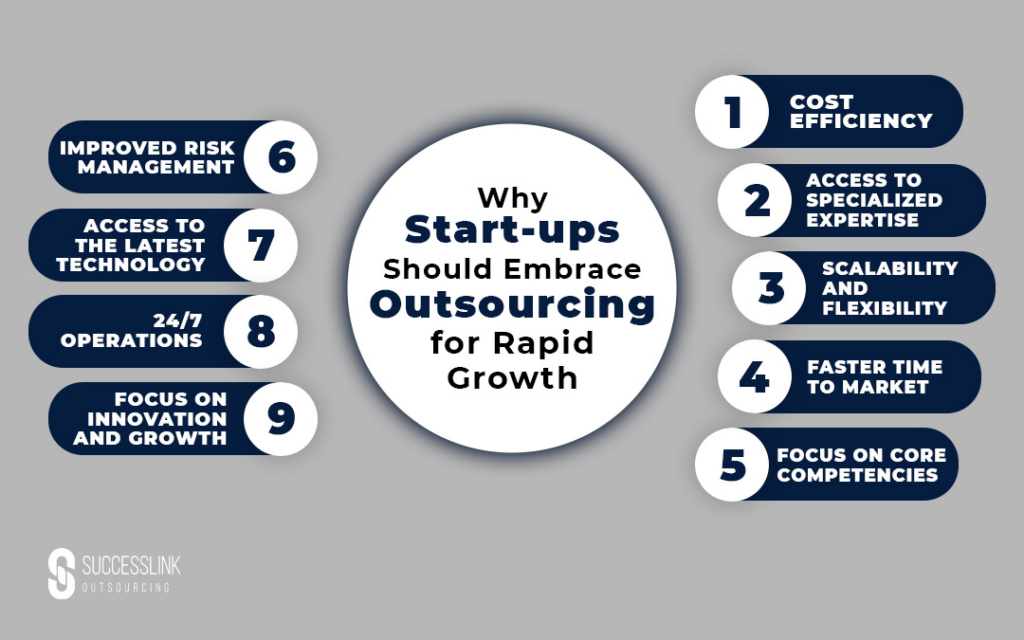Starting a business is no small feat. Entrepreneurs face a myriad of challenges, from limited budgets to operational complexities, and one of the most critical decisions they must make is how to manage resources effectively. For start-ups aiming to scale quickly, outsourcing can be a game-changing strategy. This approach allows companies to focus on their core competencies while leveraging external expertise to handle non-core functions. In this blog, we’ll dive into why start-ups should embrace outsourcing to accelerate growth and explore the many benefits that this strategy offers.

What Is Outsourcing?
Before we explore the reasons for outsourcing, it’s important to define what it entails. Outsourcing is the practice of hiring external service providers to handle tasks, operations, or functions that could otherwise be performed in-house. It can range from IT services and software development to customer support, accounting, and human resources.
For start-ups, outsourcing allows access to specialized skills and resources without the need for long-term commitments or large upfront investments. This flexibility is invaluable in the dynamic early stages of a business.

1. Cost Efficiency
Start-ups typically operate with tight budgets, making cost efficiency a top priority. Outsourcing provides a cost-effective solution by allowing start-ups to avoid the overhead associated with hiring full-time employees. There’s no need to invest in office space, equipment, or employee benefits for outsourced teams, as these expenses are covered by the service provider.
Outsourcing can also be more affordable than hiring locally, particularly when partnering with providers in countries where labor costs are lower. By reducing operational expenses, start-ups can allocate more resources to growth initiatives, such as marketing, product development, or customer acquisition.
2. Access to Specialized Expertise
Outsourcing opens the door to a global talent pool. Instead of limiting your business to local hires, you can tap into specialized expertise from around the world. Whether it’s software development, marketing, or legal services, outsourcing provides access to experts in various fields without the need to onboard them as full-time employees.
For instance, a tech start-up may outsource software development to a specialized firm with extensive experience in building scalable platforms. This ensures a higher quality of work while freeing up internal resources to focus on the company’s core products or services.

3. Scalability and Flexibility
One of the biggest challenges start-ups face is scaling their operations quickly while managing risk. Outsourcing offers the flexibility to scale up or down depending on business needs. Whether you need to ramp up customer support during a busy period or expand your IT capabilities to accommodate growth, outsourcing allows you to adjust your operations without committing to long-term contracts or making substantial investments in infrastructure.
This flexibility is crucial for start-ups, which often experience fluctuating demand. By outsourcing, you can grow at a sustainable pace and remain agile in the face of market changes.
4. Faster Time to Market
In the fast-paced world of start-ups, speed is often a competitive advantage. Outsourcing enables businesses to accelerate time to market by accessing the resources and expertise they need, often faster than they could hire and train an in-house team.
For example, a start-up that needs to launch a new product may outsource marketing or development to experienced professionals who can hit the ground running. By leveraging external partners, start-ups can meet tight deadlines and stay ahead of competitors.

5. Focus on Core Competencies
Start-ups need to stay laser-focused on their core competencies to drive growth and innovation. However, many non-core tasks, such as payroll, customer service, or IT management, can divert attention away from critical business functions.
Outsourcing these tasks allows founders and key team members to dedicate their time and energy to what matters most: product development, customer acquisition, and scaling the business. When non-core activities are handled efficiently by external partners, start-ups can prioritize growth and innovation.
6. Improved Risk Management
Outsourcing can also reduce risk for start-ups, particularly in areas where they lack expertise. For example, outsourcing legal services, compliance, or data security ensures that professionals handle these high-risk functions, minimizing the potential for costly mistakes or breaches.
Moreover, outsourcing partners often have established systems, processes, and certifications that meet industry standards. This added layer of security can help start-ups manage operational risks while maintaining compliance with relevant regulations.
7. Access to the Latest Technology
Staying current with the latest technology can be expensive for start-ups, particularly if they need to invest in software, hardware, or training. Outsourcing gives companies access to cutting-edge technology and tools that they may not be able to afford in-house.
For instance, outsourcing IT services to a provider with the latest cloud solutions or cybersecurity measures ensures that your business remains competitive and secure without the need for significant investment. By leveraging the technology of outsourcing partners, start-ups can stay at the forefront of innovation.

8. 24/7 Operations
Outsourcing to global providers can offer round-the-clock service, which is particularly beneficial for customer support, IT, or operations that require constant monitoring. By outsourcing to a provider in a different time zone, start-ups can maintain 24/7 operations without exhausting their internal team or paying for multiple shifts.
This advantage allows start-ups to improve customer satisfaction, maintain service continuity, and manage time-sensitive tasks efficiently.
9. Focus on Innovation and Growth
Start-ups thrive on innovation, but the day-to-day operational tasks can often stifle creativity and growth. By outsourcing non-essential tasks, start-ups can create more space for brainstorming, product development, and strategic planning. Outsourcing administrative, HR, or operational functions allows the internal team to focus on innovation and scaling the business.
Outsourcing also fosters a culture of innovation by bringing fresh perspectives and expertise into the company. Start-ups can benefit from the ideas and best practices of external partners, further fueling growth and creativity.

Conclusion
Outsourcing offers start-ups a wealth of benefits, from cost savings and scalability to improved focus and access to specialized expertise. By partnering with outsourcing providers, start-ups can accelerate growth, reduce operational burdens, and focus on what matters most: building a successful, innovative business. For entrepreneurs looking to scale quickly and sustainably, outsourcing is not just an option—it’s a strategic necessity.
Are you ready to supercharge your start-up’s growth through outsourcing? Contact SuccessLink Outsourcing today to learn how we can help your business achieve rapid success with tailored outsourcing solutions.

